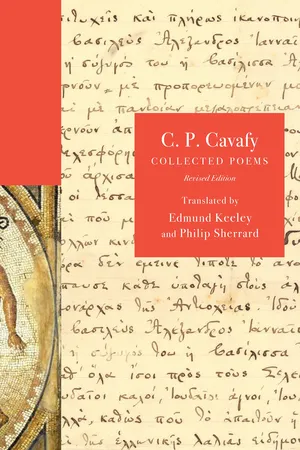![]()
“PUBLISHED POEMS”
1896-1932
![]()
WALLS
With no consideration, no pity, no shame,
they have built walls around me, thick and high.
And now I sit here feeling hopeless.
I can’t think of anything else: this fate gnaws my mind—
because I had so much to do outside.
When they were building the walls, how could I not have noticed!
But I never heard the builders, not a sound.
Imperceptibly they have closed me off from the outside world.
![]()
AN OLD MAN
At the noisy end of the café, head bent
over the table, an old man sits alone,
a newspaper in front of him.
And in the miserable banality of old age
he thinks how little he enjoyed the years
when he had strength, eloquence, and looks.
He knows he’s aged a lot: he sees it, feels it.
Yet it seems he was young just yesterday.
So brief an interval, so very brief.
And he thinks of Prudence, how it fooled him,
how he always believed—what madness—
that cheat who said: “Tomorrow. You have plenty of time.’’
He remembers impulses bridled, the joy
he sacrificed. Every chance he lost
now mocks his senseless caution.
But so much thinking, so much remembering
makes the old man dizzy. He falls asleep,
his head resting on the café table.
![]()
THE HORSES OF ACHILLES
When they saw Patroklos dead
—so brave and strong, so young—
the horses of Achilles began to weep;
their immortal nature was upset deeply
by this work of death they had to look at.
They reared their heads, tossed their long manes,
beat the ground with their hooves, and mourned
Patroklos, seeing him lifeless, destroyed,
now mere flesh only, his spirit gone,
defenseless, without breath,
turned back from life to the great Nothingness.
Zeus saw the tears of those immortal horses and felt sorry.
“At the wedding of Peleus,” he said,
“I should not have acted so thoughtlessly.
Better if we hadn’t given you as a gift,
my unhappy horses. What business did you have down there,
among pathetic human beings, the toys of fate.
You are free of death, you will not get old,
yet ephemeral disasters torment you.
Men have caught you up in their misery.”
But it was for the eternal disaster of death
that those two gallant horses shed their tears.
![]()
PRAYER
The sea engulfed a sailor in its depths.
Unaware, his mother goes and lights
a tall candle before the ikon of our Lady,
praying for him to come back quickly, for the weather to be good—
her ear cocked always to the wind.
While she prays and supplicates,
the ikon listens, solemn, sad,
knowing the son she waits for never will come back.
![]()
THE FUNERAL OF SARPEDON
Zeus mourns deeply:
Patroklos has killed Sarpedon.
Now Patroklos and the Achaians rush forward
to snatch up the body, to dishonor it.
But Zeus does not tolerate that at all.
Though he let his favorite child be killed—
this the Law required—
he will at least honor him after death.
So he now sends Apollo down to the plain
with instructions about how the body should be tended.
Apollo reverently raises the hero’s body
and carries it in sorrow to the river.
He washes the dust and blood away,
heals its terrible wounds so no trace is left,
pours perfume of ambrosia over it,
and dresses it in radiant Olympian robes.
He bleaches the skin, and with a pearl comb
combs out the jet black hair.
He spreads and arranges the beautiful limbs.
Now he looks like a young king, a royal charioteer—
twenty-five or twenty-six years old—
resting himself after winning
the prize in a famous race,
his chariot all gold and his horses the fastest.
Having finished his task this way,
Apollo calls for the two brothers,
Sleep and Death, and orders them
to take the body to Lykia, the rich country.
So the two brothers, Sleep and Death,
set off on foot toward the rich country, Lykia;
and when they reached the door
of the king’s palace,
they handed over the honored body
and then returned to their other labors and concerns.
And once the body was received in the palace
the sad burial began, with processions and honors and dirges,
with many libations from sacred vessels,
with all pomp and circumstance.
Then skilled workers from the city
and celebrated craftsmen in stone
came to make the tombstone and the to...
